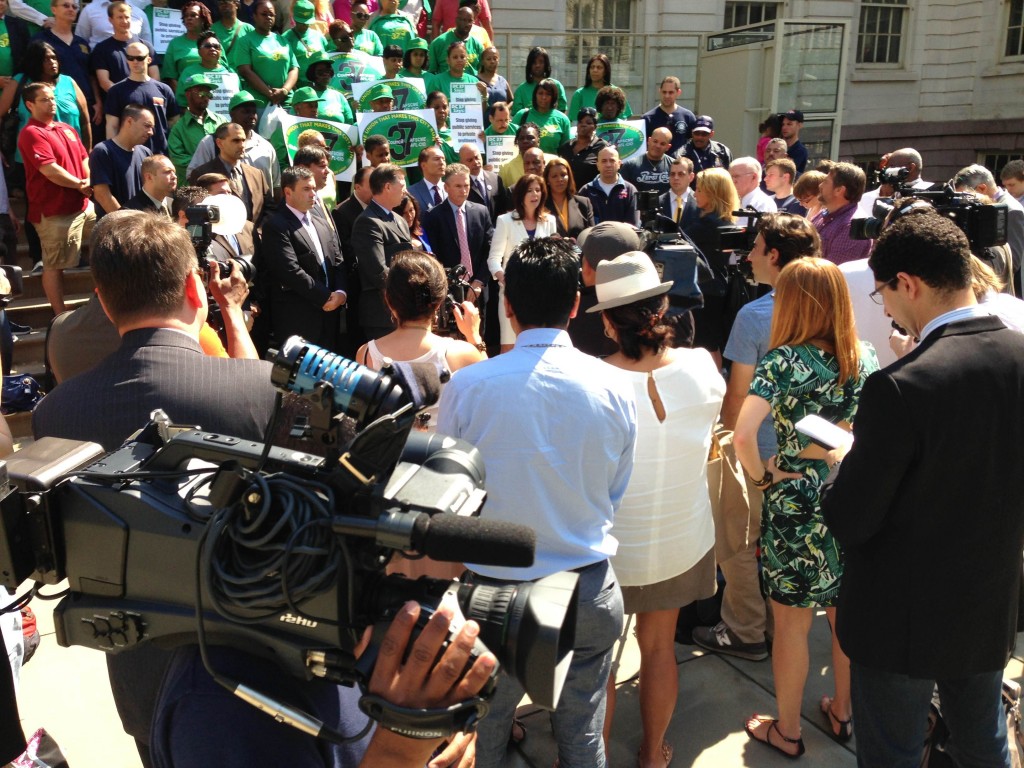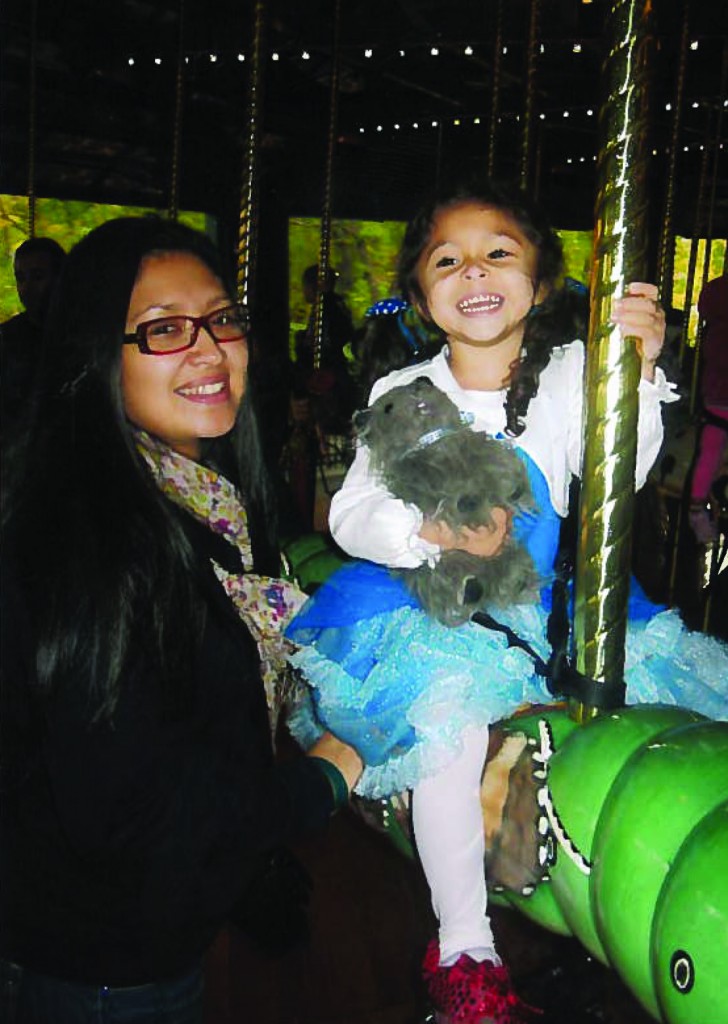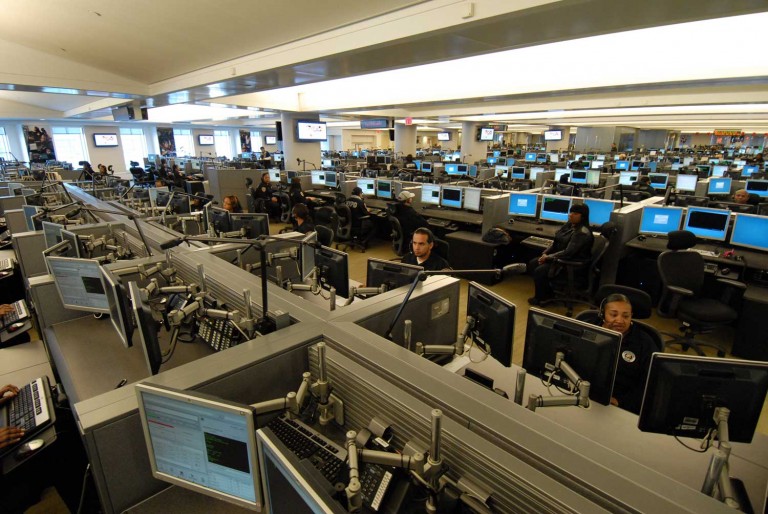
Councilwoman Elizabeth Crowley and union officials representing 911 operators, EMTs, paramedics, fire inspectors, and FDNY dispatchers rallied outside City Hall last month for the city to overhaul its 911 system, which they said is beleaguered by problems and has resulted in emergency workers being late to fires and accidents. Photo Courtesy of Elizabeth Crowley’s Office
A rising chorus of critics across the city are saying that the city’s now-embattled 911 system, known as UCT or Unified Call Taking, is malfunctioning and causing emergency responders to miss calls, respond late and report to wrong addresses with serious and, in some cases, fatal consequences.
The $2 billion UCT system, implemented by the city in 2009 in an attempt to streamline and integrate police, fire and emergency medical services, has most recently come under fire by Council members, union officials and emergency responders for critical delays in response time related to the death of a young child in Manhattan as well as a serious fire in the Bronx which injured nine firefighters.
Ariel Russo, a 4-year-old girl originally from Middle Village, was struck and killed by an unlicensed driver on the Upper West Side on June 4. Russo’s parents are suing the city for $40 million, claiming that their daughter might have survived had it not been for a delayed EMS response that totaled eight minutes.
FDNY Commissioner Sal Cassano denied the city’s 911 system was at fault, calling the delay “human error,” caused by a dispatcher who failed to see the 911 call on a screen.
And, last week, Uniformed Firefighters Association (UFA) President Steven Cassidy blamed the UCT system for a nearly 12-minute delay in alerting firefighters to a blaze in the Bronx.
Cassidy also called on the Bloomberg Administration to discontinue the use of the UCT system and return to the previous 911 call dispatch system whereby calls were routed immediately, by borough and type of emergency, to the appropriate agency. The firefighters union is expected to sue City Hall over the centralized call system and demand a return to the way 911 calls were previously handled.
Tom Butler, a spokesman for the UFA, said that firefighters have been complaining since 2009 of misdirected calls throughout the city.
“We’ve had calls for firefighters that police should have been dispatched to,” Butler said.
He added that when the system doesn’t dispatch calls promptly, it allows blazes to get worse and other emergency situations to become dire, endangering both first responders and victims alike.
The UCT system has all 911 calls routed first through an NYPD dispatcher, who collects information about the emergency from the caller, enters that information into an electronic database and then routes the call to the appropriate police, fire or EMS dispatcher.
Critics of the system, such as Councilwoman Elizabeth Crowley (D-Middle Village), who is also the chair of the Committee on Fire and Criminal Justice Services, said that the way the UCT operates is flawed and is causing many of the system’s delays in getting calls properly routed to emergency responders.
Crowley is seeking a return to the city’s system prior to 2009, when dispatchers “immediately moved calls to a fire, police or emergency medical dispatcher.”
She also added that the UCT system makes the entire process more complicated. “We can’t waste time in a critical situation.”
At a June 21 city Council hearing, Eddie Boles, an FDNY Lieutenant called the city’s UCT system a “horrific failure” and one that endangers both residents and first responders.
Boles also accused the city of ignoring its own consultant’s report by Winborne and Costas, which found in 2011 that the UCT system was “dangerous” and recommended discontinuing its use and replacing with no-cost dispatching methods that would improve business and practices within the NYPD and FDNY’s communications centers.

Ariel Russo, of Middle Village, died when she was hit by a car on the Upper West Side in June. The 4-year-old’s parents are now suing the city, saying its 911 system did not allow emergency officials to respond in time to save her.problems and has resulted in emergency workers being late to fires and accidents. Photo Courtesy of Sanford Rubinstein
Also at the hearing, Deputy Mayor Cas Holloway, during a three-hour plus presentation, defended the city’s UCT system, saying it only had some “minor glitches.”
Moreover, Crowley said that no ambulance was ever dispatched to help Ariel Russo because the “system failed.”
In addition, a recent Daily News story highlighted emails from the city where supervisors reported that many calls were being “dropped” or “missed” on a daily basis.
“The mayor needs to understand that this investment [in UCT system] that he’s made is just not working,” Crowley added, emphatically.
She also believes that the UCT system was never properly tested before being put into widespread use and it was a key error in having the NYPD as the system’s administrator.
Further, Crowley noted that many of the emergency calls are fire or medical-related and police aren’t qualified to handle those calls. “Many of the medical dispatchers are EMTs, likely qualified to dispense immediate medical info to a caller, even while dispatching an ambulance.”
Other fire officials have speculated that the city may have believed this system would eliminate the need for scores of dispatchers, thus allowing the city to save money.
Asked about a short-term fix for the 911 system, Crowley said the city should return to its older methods of answering and routing calls.
“Operators should immediately ask: what borough are you in and what is your emergency,” she said.
Crowley added operators shouldn’t wait to ask for all the information and then pass the call on. “Dispatchers should immediately conference in the appropriate service,” Crowley said. “Time is being wasted.
“On the Council, I have been the most critical of the system,” she continued. “I want people to contact the mayor’s office about this because it affects everyone.”
WHAT TO DO – AND NOT TO WHEN YOU CALL 9-1-1
1. Don’t panic. Obviously, when you are making a 9-1-1 call to emergency services, you are in an emergency, and have a lot of adrenaline pumping. This could cause you to start talking talking too fast, too slow, begin stuttering, etc. Make sure you are far enough away from the emergency to be safe unless someone is badly hurt.
2.Find a phone. Preferably a land line unless it’s a fire or burglary. This will help determine your location. If it’s a fire, don’t stay in the building, get out first.
3. When calling make sure you do not hang up if you don’t connect immediately—it takes a little time to connect sometimes.
4. Know what you will be asked. Make sure you know each of the following:
a. Where is the emergency?
b. The nature of the emergency—do you need law enforcement, medical assistance, firefighters?
c. A detailed but concise description—what happened? How many details do you know? What is the most important? Generally the most important thing is the reason you need assistance—there is a gunshot wound followed by what cause you to need this assistance—there’s a man with a gun in the store.
d. The phone number of your phone
e. Location. Make sure you give the dispatcher all the details of your location. Know the address and cross streets from where you are.
5. Listen to the dispatcher. Follow orders—the better you do that the more survival rate increases. Even in non life threatening situations this is vital.
6. Do not hang up until instructed to. Anything can happen, and the emergency services need to know your situation at all times. If the building is on fire, for example, the dispatcher will need to know if there are other people in the building and where any safe exits are.
By Alan Krawitz

